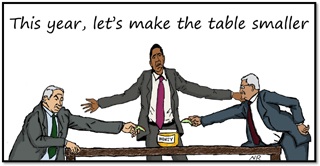
August 2010 Archives

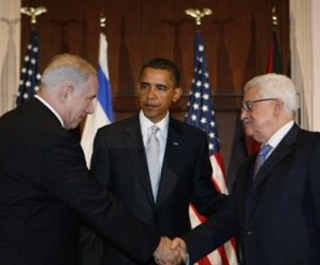
Washington, DC - Americans for Peace Now (APN) president and CEO Debra DeLee today issued the following statement on the re-launching of Israeli-Palestinian peace talks:
Washington, DC -- APN today unequivocally condemned the terrorist attack in the West Bank that killed four Israelis. APN President and CEO Debra DeLee stated:
"Today's attack is a senseless act of violence whose likely purpose is to derail the peace talks that are set to get underway in Washington this week. There are no doubt self-appointed spoilers who want to force both Israelis and Palestinians to spurn negotiations in favor of continued conflict. They cannot be permitted to succeed."
APN is America's leading Jewish organization advocating peace for Israel.
Americans for Peace Now's response is more measured.
Not that we don't savor the moment. Of course we do. Even after all the failures and disappointments of the past, it's exciting to see the leaders of Israel and the Palestinians sitting down to negotiate peace, face to face, and to do so under the auspices of a US President who clearly remains committed to achieving peace.
At this time, we are less interested in celebrating the opening of talks itself, and more interested in making sure this week's Washington gathering is not merely another ceremony, but the beginning of a process that will yield real results.
Glib talk about settlements harms peace efforts
With the resumption of Israeli-Palestinian talks this week and the approaching September 26th expiration of the settlement moratorium, the settlements issue is set to once again take center stage.
Last week, in an otherwise excellent article, former US Ambassador to Israel Martin Indyk suggested that this need not be a crisis. He stated that "there could be a workable compromise if Mr. Netanyahu restricts building to modest growth in the settlement blocs that will most likely be absorbed into Israel in the final agreement, while offering changes that would make a real difference to West Bank Palestinians..."
The following day, Haaretz's Aluf Benn offered a similar observation as he laid out the popular wisdom regarding what can be expected from Prime Minister Netanyahu. Benn stated that "Everyone agrees the sweeping construction freeze cannot be continued and that the large settlement blocs should be distinguished from the isolated settlements beyond the separation fence. Construction will resume in the blocs and be frozen in the isolated settlements--or continue on a small scale."
This narrative is highly attractive to analysts and pundits because it is simple to articulate, sounds reasonable, and offers an easy answer to the question: how can Netanyahu possibly continue the settlement moratorium? The answer? He doesn't have to.
Unfortunately, this narrative has two huge flaws.
 "The unfortunate decision of the theater managers to export the finest plays being staged in Tel Aviv, Haifa and Beer Sheva to none other than the largest settlement built by Israel--caused a courageous group of artists and actors to stand up for their principles and refuse to perform in the territories."
"The unfortunate decision of the theater managers to export the finest plays being staged in Tel Aviv, Haifa and Beer Sheva to none other than the largest settlement built by Israel--caused a courageous group of artists and actors to stand up for their principles and refuse to perform in the territories."Following the op ed is:
Ha'aretz: "Netanyahu: State should not fund any theater that boycotts Ariel"
Ma'ariv: "The Lecturers' Boycott"
Walla: "Oz, Yehoshua and Grossman Support Theater Workers' Protest"
By GADI TAUB
Tel Aviv
WILL Israel remain a Zionist state? If so, what kind? These are the important questions in Israeli politics today, and will be looming over the direct talks between Israel and the Palestinian Authority scheduled to begin Thursday in Washington.
By BEN HARTMAN
Protesters argue renewed building would ruin talks.
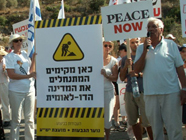
Dozens of activists attended a rally organized by Peace Now near the Talmon settlement, between Modi'in Illit and Ramallah, on Thursday, to demonstrate their support for an extension of the settlement freeze that is set to expire on September 26.
Following the JPost article is: Ynet News: "Leftists protest against resumption of West Bank building"
By MELANIE LIDMAN
Municipality: Any talk of a freeze is baseless.
The approval process for new Jewish homes in east Jerusalem has slowed dramatically since March's diplomatic crisis during Vice President Joe Biden's visit, according to data made available to The Jerusalem Post by Ir Amim and Peace Now. But several Israeli officials denied any deliberate slowdown.
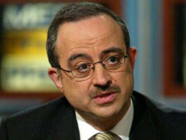 While most experts and pundits advise an incremental approach to an separate Israeli-Palestinian peace, Marwan Muasher, Jordan's former foreign minister and ambassador to Washington and Israel supports a much more ambitious regional approach, which harnesses the Arab League's Peace Initiative to the Israeli-Palestinian peace efforts.
While most experts and pundits advise an incremental approach to an separate Israeli-Palestinian peace, Marwan Muasher, Jordan's former foreign minister and ambassador to Washington and Israel supports a much more ambitious regional approach, which harnesses the Arab League's Peace Initiative to the Israeli-Palestinian peace efforts. Golan, a Peace Now founder and Executive Committee Member, is the former head of the Department of Political Science at the Hebrew University of Jerusalem and currently professor of Government at the Interdisciplinary Center, Herzliya.
(This article first appeared in Maariv.)
----------------------------------------
What we are experiencing here in Israel with regard to the attack on academia and civil society may resemble more the Soviet Union than America of the '50s.
 While most experts and pundits advise an incremental approach to an separate Israeli-Palestinian peace, Marwan Muasher, Jordan's former foreign minister and ambassador to Washington and Israel supports a much more ambitious regional approach, which harnesses the Arab League's Peace Initiative to the Israeli-Palestinian peace efforts. Continue reading
While most experts and pundits advise an incremental approach to an separate Israeli-Palestinian peace, Marwan Muasher, Jordan's former foreign minister and ambassador to Washington and Israel supports a much more ambitious regional approach, which harnesses the Arab League's Peace Initiative to the Israeli-Palestinian peace efforts. Continue reading
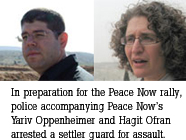
Peace Now will hold a demonstration on Thursday, August 26 outside the West Bank settlement of Talmon. It will be a strong stand against the calls - coming from the Israeli right - for Israel to immediately build in settlements after the moratorium on new settlement construction expires next month.
Following Boston Globe article is: Jerusalem Post: "Clinton announces direct talks to resume on Sept. 2" & Ha'aretz: "Netanyahu welcomes renewal of direct peace talks with Palestinians"
Now the real hard work must begin. Direct talks are not an end in themselves; their only value is as a means to achieve an Israeli-Palestinian peace agreement.
A strong American role is needed to ensure that these negotiations will be productive.
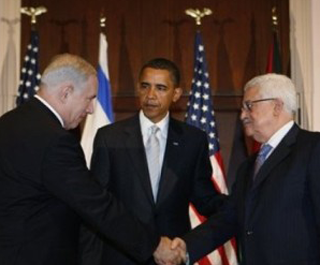
Press Release
For Immediate Release
August 20 , 2010
Washington, DC - While welcoming the announcement of direct peace talks between Israel and the Palestinians, Americans for Peace Now calls on the parties to negotiate in earnest. APN also urges President Obama to be prepared to press both parties to engage in the talks to see them succeed.
APN President and CEO Debra DeLee commented:
 The steady march of settlements, the rightward shift in Israeli
politics, the growing sense that a conflict-ending peace agreement is
impossible -- all these things are feeding some pundits' impulse to
declare the death of the two-state solution as a means of ending the
Israeli-Palestinian conflict.
The steady march of settlements, the rightward shift in Israeli
politics, the growing sense that a conflict-ending peace agreement is
impossible -- all these things are feeding some pundits' impulse to
declare the death of the two-state solution as a means of ending the
Israeli-Palestinian conflict.But what are the alternatives?
APN's small study tour will take place from February 5th to 12th, 2011, and will be led by Professor Mark Rosenblum, APN founder and Israel/Middle-East Expert (see bio at the end of this entry).
TOP ROW: Yossi Beilin, APN's Frank Fisher and Tzippi Livni, APN Tour Group in West Bank, Yariv Oppenheimer; MIDDLE: Letty Cottin Pogrebin & President Mahmoud Abbas, Hagit Ofran leading an APN group, APN dinner with young Peace Now activists; BOTTOM: Haim Ramon, Barrier Wall in Jerusalem, Tzali Reshef & Debra DeLee
Summary
The Israeli-Palestinian situation today is eerily reminiscent of the situation in 2000 when plummeting expectations, coupled with events in Jerusalem, triggered an eruption that devastated the political process.
But while the situation wasn't pretty, there were always lines Israel did not cross - lines that Israel is crossing today, apparently utterly unconcerned by the consequences.
 On the front page of the Style section in yesterday's Washington Post is a story about a remarkable internship program.
On the front page of the Style section in yesterday's Washington Post is a story about a remarkable internship program.This was no typical Washington internship. APN hosted a Palestinian student, while the American Task Force on Palestine (ATFP) hosted an Israeli student. The two worked together on joint projects, lived together, and became close friends.
 (Pictured: Peace Now activist placing an announcement during the current campaign)
(Pictured: Peace Now activist placing an announcement during the current campaign)Soldier from elite Givati Brigade attacked activists passing out flyers near Tel Aviv's central train station; Peace Now to file formal complaint against soldier.
By Yaniv Kubovich

 Israeli soldiers last week again had to chase lawless settlers on the hills of the West Bank.
Israeli soldiers last week again had to chase lawless settlers on the hills of the West Bank.This time, it was settlers from Yitzhar and Bracha, near Nablus, who vandalized Palestinian property, blocked roads, torched fields, sabotaged Israel Defense Forces vehicles, punched, kicked Israeli police officers, cursed and harassed them and resisted arrest...
The details of what took place today are still emerging, but one thing is clear: Without strong American leadership events like today's could spiral out of control.
Tell President Obama to engage to prevent an escalation.
In 2006, we saw fighting along the Israel-Gaza and the Israel-Lebanon borders escalate into a full-on war. Today's developments - coming on the heels of an uptick in rocket fire targeting southern Israel - are eerily similar.
 Peace Now claims settlers violated freeze in West Bank.
Peace Now claims settlers violated freeze in West Bank. In defiance of the moratorium on new housing construction, settlers have begun work on 295 new permanent homes in the first half of 2010, according to a report published Monday by Peace Now.
Settlers said the report was false.
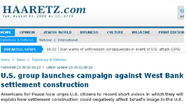 APN's Video Campaign received top billing on Ha'aretz online:
APN's Video Campaign received top billing on Ha'aretz online:Americans for Peace Now urges U.S. citizens to record short videos in which they will explain how settlement construction could negatively affect Israel's image in the U.S.
By Natasha Mozgovaya
(Go HERE to see a sample video and instructions to make your own)
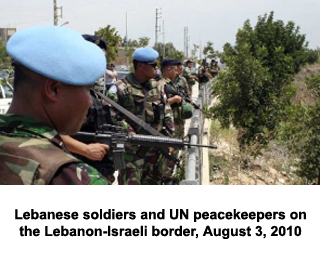 Washington, DC - Americans for Peace Now (APN) today called on the Obama Administration to act quickly and resolutely to prevent an escalation of tensions and military action on the Israel-Lebanon border and between Israel and Gaza.
Washington, DC - Americans for Peace Now (APN) today called on the Obama Administration to act quickly and resolutely to prevent an escalation of tensions and military action on the Israel-Lebanon border and between Israel and Gaza. The Peace Now movement says Israel must choose between continuing the settlement building freeze -- which would lead to international support for the diplomatic process and strengthening of the economy -- or construction in settlements.
The Peace Now movement says Israel must choose between continuing the settlement building freeze -- which would lead to international support for the diplomatic process and strengthening of the economy -- or construction in settlements. According to the organization, some 400 housing units have been built in violation of the construction moratorium in Judea and Samaria.
The settlement building moratorium is due to expire in September.
Weissglas - who is by no means a dove (no pun intended) - closes with these powerful words: "The outline of the possible solution is clear: the establishment of a Palestinian state, the evacuation of most of Judea and Samaria with some territorial swaps, devising a joint control arrangement in Jerusalem based on demographic principles, and the resettling of the Palestinian refugees within the borders of the Palestinian state. The present government, like any other government, will be unsuccessful in substantially altering this outline. The sooner it makes the painful decisions necessary for its implementation, the sooner Palestinian suspicions will evaporate and chances will grow for a successful outcome to talks."
Mr. Weisglass, we couldn't agree more.
Full Weissglass op-ed after the break (translation by Israel News Today).
This would be bad for Israel and bad for peace: Settlement construction undermines faith in peace talks. Settlements constitute a burden to Israel's security services. They create points of friction between Israelis and Palestinians. And they drain Israel's financial resources.
For these reasons, APN activists have worked together to convince Washington to press for a continuation of the moratorium.
Now, it is time to focus our efforts on another important message: As Americans who love Israel, we know that ending the settlement moratorium would play into the hands of those who seek to delegitimize Israel.
We need to deliver this message directly to Israelis, many of whom are not aware of the impact that new settlement construction could have on public American support for Israel.
As part of this effort, APN is asking our activists to make short videos explaining how new settlement expansion could undermine Israel's standing in their communities. The top videos we receive will be featured in Israel starting August 10th as part of the new campaign by the Israeli Peace Now movement.
Here is one such video: